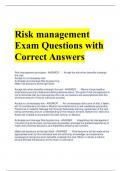Risk management Exam Questions with Correct Answers Risk management principles - ANSWER Accept the risk when benefits outweigh the cost. Accept no unnecessary risk. Anticipate and manage Risk by planning. Make risk decisions at the right level. Accept risk when benefits outweigh the cost - ANSWER Marine Corps tradition emphasizes seizing initiative and taking decisive action. The goal of risk management is not to eliminate risk, but management the r isk, so missions are accomplished with the minimum amount of loss to maximize success Accept no unnecessary risk - ANSWER An unnecessary risk is one of that, if taken, will not contribute to the task or Mission accomplishment or will needlessly jeo pardize Personnel or material. Manage risk through Relentless training, awareness of the rest being confronted, and an understanding of the mission at hand. Bottom line - take only those risk needed to accomplish the task, activity, or Mission. Anticipate and manage Risk by planning - ANSWER Integrating risk management into planning at all levels, and as early as possible, provides the greatest opportunity to make well -informed decisions and Implement effective risk controls. Make risk decisions at the right level - ANSWER Risk decisions will be made at the appropriate level, by the individual with the authority, knowledge, and experience necessary to recognize when benefits outweigh the cost. When in doubt, a marine should Elevate the decisio n of the chain of command. Elevate the decision up the chain of command - ANSWER When you question your Authority, knowledge, or experience necessary to determine whether the risk will outweigh the cost, what should you do? Risk management levels - ANSWER In depth Deliberate Time critical In depth - ANSWER Applies when the available time for planning is not limiting factor and involves a very through risk assessment when the hazards and Associated risks are not well understood. Exam ples include long -term planning of complex operations, introduction of new equipment, materials, and missions, development of tactics and training curriculum, and major system overhaul of repair Deliberate - ANSWER Refers to situations where there is ample time to apply to risk management process to Mission planning Evolution. This level as his primary experience personnel and brainstorming to insert it into five hazards, review mishap trans, and develop controls. It is more effective when done in a group. The Marine Corps planning process (MCCP) and drafting or updating standard operating PROCEDURES (SOP) or letters of instructions LOI are examples Time critical - ANSWER This is the level at which Personnel operate on a daily basis both on a nd off duty. The term critical level is the normal risk management level use during the execution phase of training or operations. There is little or no time to make a formal plan resulting in an on -the-spot mental or verbal risk assessment and decision. Risk management 5 -step process cycle - ANSWER Identify hazards , assess hazards, make risk decisions, Implement controls, supervise. Identify hazards - ANSWER A hazard is defined as any condition with the potential to negatively impact the t ask, activity or mission, cause property damage, injury to personal or death. Assess hazards - ANSWER For Hazzard identify, determine Associated degree of risk in terms of probability and severity. The result of the risk assessment is a prioritized is a list of Hazards ensuring control and being into 5 for the most serious threat to task, Mission, personne l, and Equipment before the last serious threats. Make risk decisions - ANSWER There are two sub steps to make informed decisions: 1) identify and assess risk control options reject, a boy, delay an accent, transfer, and compensate. 2) determine th e type of control engineering, administrative, or physical personal protective equipment PPE




